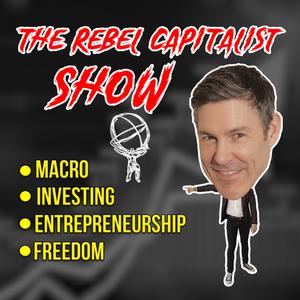
The Jay Martin Show
Jay Martin
- 59 minutes 35 secondsNation-State Breakdown: Is This the End?
On this week's episode, Grant Williams dissects the economic and geopolitical challenges redefining 2025. The conversation examines Germany’s faltering economy, Europe’s growing instability, and the global ripple effects of Donald Trump’s return to power. Topics include inflationary and deflationary pressures, the nation-state model’s decline, and strategies for investors to prepare for heightened risks.
https://x.com/ttmygh
Get Your FREE Tickets to the VRIC: https://2ly.link/211hF
For more content from host Jay Martin, please visit The Commodity University at: https://2ly.link/211gp
Sign up for my free weekly newsletter at https://2ly.link/211gx
Be part of our online investment community:
https://cambridgehouse.com
https://twitter.com/JayMartinBC
https://www.instagram.com/jaymartinbc
https://www.facebook.com/TheJayMartinShow
https://www.linkedin.com/company/cambridge-house-international
0:54 - "Key Trends Shaping 2025"
12:10 - "How Has the Investment Landscape Shifted?"
20:28 - "Inflation vs. Deflation: What Wins?"
30:50 - "What’s Trump’s Trade War Strategy?"
38:18 - "Why Is Germany’s Economy Failing?"
42:00 - "Could the EU Survive Without Germany?"
48:12 - "Is the Nation-State Model Dying?"
52:17 - "How Do Energy Policies Impact Economics?"
56:30 - "Who Could Replace Germany in the EU?"
59:11 - "What’s Next for Europe’s Future?"
Copyright © 2024 Cambridge House International Inc. All rights reserved.
5 January 2025, 8:00 am - 50 minutes 12 secondsSyria’s Collapse: The Shocking Reality the World Is Missing
On this week's episode Glenn Diesen unpacks the Syrian conflict’s geopolitical complexities and its global implications. Glenn analyzes the interests of key players like the U.S., Russia, Iran, Israel, Turkey, and China. Topics include Russia's naval ambitions, Iran's loss of the Shia Crescent, Israel’s destabilization tactics, and Turkey’s neo-Ottoman aspirations. The discussion also explores the U.S.’s ambiguous role, the Ukraine war's ripple effects, and the rise of BRICS as an alternative to U.S.-centric systems. Glenn warns of escalating Middle East tensions amidst a shifting global power balance.
https://x.com/Glenn_Diesen
Get Your FREE Tickets to the VRIC: https://2ly.link/211hF
For more content from host Jay Martin, please visit The Commodity University at: https://2ly.link/211gp
Sign up for my free weekly newsletter at https://2ly.link/211gx
Be part of our online investment community:
https://cambridgehouse.com
https://twitter.com/JayMartinBC
https://www.instagram.com/jaymartinbc
https://www.facebook.com/TheJayMartinShow
https://www.linkedin.com/company/cambridge-house-international
0:00 - Intro
1:10 - Who’s Behind Syria’s Revolution?
5:44 - Russia and Iran: Stretched Too Thin?
8:47 - Ukraine’s Hidden Role in Syria?
12:24 - Syria’s Future: Chaos or Order?
18:02 - Could a New U.S. President Shift Geopolitics?
23:21 - Turkey’s Neo-Ottoman Ambitions
26:14 - China’s Quiet Strategy in Syria
29:00 - Is a Russia-Ukraine Peace Deal Near?
38:34 - Middle East Boiling Over
44:15 - BRICS: A New Global Challenge?
Copyright © 2024 Cambridge House International Inc. All rights reserved.
22 December 2024, 8:00 am - 55 minutes 2 seconds5 SHOCKING Indicators the Economy is Heading for Total Collapse
Today on the Jay Martin Show, Jay sits down with Danielle DiMartino Booth, CEO of QI Intelligence and author of Fed Up. the pair dissect critical economic and geopolitical trends shaping today's markets. They explore the historic overvaluation of the stock market, rising consumer debt, and the hidden vulnerabilities in the gig economy. Danielle offers insights into the challenges facing commercial real estate, multigenerational housing trends, and the surge in build-to-rent developments. The conversation also touches on Canada’s shifting economic landscape, the implications of leadership vacuums, and what lies ahead for global markets in 2025.
Get Your Tickets to the VRIC: https://2ly.link/211hF
For more content from host Jay Martin, please visit The Commodity University at: https://2ly.link/211gp
Sign up for my free weekly newsletter at https://2ly.link/211gx
Be part of our online investment community:
https://cambridgehouse.com
https://twitter.com/JayMartinBC
https://www.instagram.com/jaymartinbc
https://www.facebook.com/TheJayMartinShow
https://www.linkedin.com/company/cambridge-house-international
0:00 - Intro
1:21 - Historic Overvaluation of the Stock Market
4:04 - Consumer Debt and Economic Fragility
10:54 - The Gig Economy's Hidden Risks
14:33 - Job Data Revisions and Economic Reality
16:10 - Rising Unemployment and Market Impact
20:50 - Commercial Real Estate on Shaky Ground
26:07 - Multigenerational Living and Housing Trends
32:15 - The Build-to-Rent Boom
39:08 - Hurricanes and Investor Housing Fallout
43:41 - Canada's Economic Crossroads
Copyright © 2024 Cambridge House International Inc. All rights reserved.
15 December 2024, 8:00 am - 52 minutes 23 secondsAre We Heading Toward Financial Ruin?
In this weeks episode, Jeff Snider of Eurodollar University breaks down recent selling activity in the U.S. Treasury market by countries like China and Japan. Snider explains that China's sales of treasuries are driven by dollar scarcity rather than a lack of confidence in the U.S. dollar, debunking common media narratives. Snider underscores the signals of a potential global downturn, citing market behaviours such as rising U.S. dollar values, lower interest rate swap spreads, and subdued copper-to-gold ratios, suggesting significant economic challenges ahead.
Eurodollar University - YouTube
https://www.eurodollar.university/
Get Your FREE Tickets to the VRIC: https://2ly.link/211hF
For more content from host Jay Martin, please visit The Commodity University at: https://2ly.link/211gp
Sign up for my free weekly newsletter at https://2ly.link/211gx
Be part of our online investment community:
https://cambridgehouse.com
https://twitter.com/JayMartinBC
https://www.instagram.com/jaymartinbc
https://www.facebook.com/TheJayMartinShow
https://www.linkedin.com/company/cambridge-house-international
0:00 - Intro
0:27 - Is China Dumping U.S. Treasuries?
4:47 - Why Are China and Japan Selling Treasuries?
11:56 - Does a Treasury Sell-Off Signal Trouble?
20:34 - What’s Wrong with China's Stimulus Approach?
26:12 - How Bad is the Economic Situation in Europe?
31:24 - Is Europe’s Economic Recovery a Myth?
32:15 - Are U.S. Payroll Numbers Misleading?
36:40 - What Does Warren Buffett’s Shift Say About Markets?
40:03 - Could Global Economies Be Stumbling Simultaneously?
43:19 - Can Presidential Policies Change the Economic Path?
46:32 - Is a Global Recession Already Baked In?
Copyright © 2024 Cambridge House International Inc. All rights reserved.
1 December 2024, 8:00 am - 1 hour 10 minutesEconomic Revolution or Total Collapse? Analyzing Trump’s America First Economy
This episode of The Jay Martin Show features an in-depth conversation with renowned macro strategist David Hunter, offering a deep dive into his macro thesis and bold predictions for the future. The discussion covers the impact of the recent U.S. election on financial markets, Trump’s potential policy influence and China’s economic challenges. This episode examines the major shifts ahead and how investors can navigate extreme market volatility to protect their portfolios.
Get Your FREE Tickets to the VRIC: https://2ly.link/211hF
For more content from host Jay Martin, please visit The Commodity University at: https://2ly.link/211gp
Sign up for my free weekly newsletter at https://2ly.link/211gx
Be part of our online investment community:
https://cambridgehouse.com
https://twitter.com/JayMartinBC
https://www.instagram.com/jaymartinbc
https://www.facebook.com/TheJayMartinShow
https://www.linkedin.com/company/cambridge-house-international
0:00 - Intro
2:19 - The Election’s Impact on Market Outlook
6:01 - Trump’s Policies and the 2030s Global Outlook
11:25 - Reforming Government Transparency and Efficiency
18:19 - America’s Next Industrial Revolution
30:53 - China’s Path to Becoming the Next Japan
45:06 - China’s Stimulus as a Temporary Fix
50:20 - $500 Oil and $20,000 Gold Are Real Possibilities
59:53 - Positioning to Avoid 80% Market Losses
Copyright © 2024 Cambridge House International Inc. All rights reserved.
24 November 2024, 8:00 am - 1 hour 2 minutesBidenomics and the Fed: Did the Elites Get Richer? Hanke Explains
Today on The Jay Martin Show, Professor Steve Hanke critiques the Biden administration’s fiscal and monetary policies for exacerbating wealth inequality and driving public resentment. He attributes these issues to reckless fiscal expansion and Federal Reserve actions, which disproportionately benefited the wealthy. Hanke also examines global conflicts in Ukraine, the Middle East, and U.S.-China tensions, offering insights into their economic ramifications. For investors, he advises caution with risk assets, recommending gold and U.S. Treasury bonds as safer options amid market volatility.
Explore the groundbreaking insights of Steve Hanke and Leland Yeager in their latest book, *Capital, Interest, and Waiting: Controversies, Puzzles, and New Additions to Capital Theory*.
Get your copy here: https://link.springer.com/book/10.1007/978-3-031-63398-0
Claim your discount by following the information provided in this flyer: https://bit.ly/4hUgTbI
The Commodity University: https://thecommodityuniversity.com/
Sign up for my free weekly newsletter at https://jaymartin.substack.com/subscribe
Be part of our online investment community:
https://cambridgehouse.com
https://twitter.com/JayMartinBC
https://www.instagram.com/jaymartinbc
https://www.facebook.com/TheJayMartinShow
https://www.linkedin.com/company/cambridge-house-international
0:00 - Intro
2:25 - Are Election Reactions a Paradigm Shift?
9:05 - Why Did the Rich Get Richer?
14:45 - Is Resentment Driving Political Outcomes?
20:30 - The Influence of Podcasts on Elections
25:15 - Can the Swamp Be Drained?
30:50 - Will Global Conflicts Shift Under New Leadership?
35:20 - What Happens to the U.S. in the China Standoff?
41:50 - How Should Investors Read Today’s Market?
46:25 - Why Gold and Bonds Are the Safer Bet
50:15 - Is the Dollar's Dominance at Risk?
54:00 - What’s Next in Interest Rates and Monetary Policy?
57:20 - Why Deferred Gratification Drives Prosperity
Copyright © 2024 Cambridge House International Inc. All rights reserved.
17 November 2024, 8:00 am - 1 hour 16 minutesUSA vs BRICS: Are we at the end of America’s Global Dominance?
In this episode of The Jay Martin Show, Dr. Pascal Lottaz explores rising global tensions surrounding Taiwan, BRICS, and shifting power dynamics. He explains Taiwan's unresolved conflict as a legacy of the Chinese Civil War, drawing parallels to North and South Korea, and describes how foreign influence often fuels local conflicts. Lottaz highlights BRICS as a non-Western alternative shaping global relations but notes its challenges with internal cohesion.
The Commodity University: https://thecommodityuniversity.com/
Sign up for my free weekly newsletter at https://jaymartin.substack.com/subscribe
Be part of our online investment community:
https://cambridgehouse.com
https://twitter.com/JayMartinBC
https://www.instagram.com/jaymartinbc
https://www.facebook.com/TheJayMartinShow
https://www.linkedin.com/company/cambridge-house-international
0:00 Intro
1:15 - Is There a Pattern Behind the World's Hot Spots?
5:12 - How Does the Shift to a Multipolar World Fuel Conflicts?
17:10 - BRICS Membership vs. Partnership: What’s the Real Difference?
26:15 - Will the Taiwan-China Standoff Lead to War?
34:08 - Why Is Taiwan So Important to China and the U.S.?
42:00 - Is Taiwan’s Prosperity Hiding a Looming Conflict?
50:19 - Why Does America Prioritize Taiwan Over Other Global Issues?
1:02:32 - Does Idealism Make the West Bad at Managing Conflicts?
1:09:05 - Are We Already in World War III?
Copyright © 2024 Cambridge House International Inc. All rights reserved.
10 November 2024, 8:00 am - 1 hour 6 minutesBRICS is Loading Up On GOLD and SILVER - Is This the New Financial Order?
In this interview, Jay Martin and Andy Schectman discuss the outcomes of the 2024 BRICs summit, highlighting growing global financial alliances and alternatives to Western-led systems. They explore the increasing influence of the BRICs nations in forming new frameworks for cross-border transactions and commodity exchanges outside the dollar-dominated SWIFT system. Schectman emphasizes the broader implications of the summit’s outcomes, including initiatives like BRICs Pay and BRICs Clear, which aim to enable more regional economic independence. They also touch on a lesser-known bank failure in Oklahoma as a potential sign of financial instability in the U.S., underscoring a potential shift in global financial power dynamics.
https://milesfranklin.com/
The Commodity University: https://thecommodityuniversity.com/
Sign up for my free weekly newsletter at https://jaymartin.substack.com/subscribe
Be part of our online investment community:
https://cambridgehouse.com
https://twitter.com/JayMartinBC
https://www.instagram.com/jaymartinbc
https://www.facebook.com/TheJayMartinShow
https://www.linkedin.com/company/cambridge-house-international
01:31 - Recap of the BRICs Summit: What Were the Key Takeaways?
05:31 - Diverging Mandates: Are BRICs Countries United or Divided in Their Goals?
08:07 - Hidden Tensions: Is BRICs Unity a Temporary Alliance?
21:13 - SWIFT vs. Ambridge: The New Currency System That Could Challenge the Dollar
22:58 - What Prompted the U.S. to Push Back on BRICs’ Currency Plans?
33:06 - Shifting Strategies: From Paper Contracts to Hard Asset Accumulation
43:08 - Poland’s Gold Accumulation: A Signal of Financial Independence?
50:39 - Oklahoma Bank Failure: Setting a Precedent for Bail-ins?
58:11 - FDIC Limits: Are Uninsured Deposits Truly at Risk?
Copyright © 2024 Cambridge House International Inc. All rights reserved.
3 November 2024, 7:00 am - 1 hour 14 minutesUkraine vs Russia: The Real Nuclear Threat is NOT what you think.
Welcome to the Jay Martin Show. In this week's episode, Serhii Plokhii, a professor of Ukrainian history at Harvard, explores the complex historical and geopolitical roots of the Russia-Ukraine conflict. He emphasizes that the struggle is deeply tied to the disintegration of the Soviet Union and Russia’s ambitions to reclaim influence over its former territories, with Ukraine being a crucial component of this agenda. Plokhii highlights that the greater nuclear threat lies not in weapons but in the vulnerability of nuclear power plants in conflict zones, which could trigger catastrophic events.
Serhii's Books:
https://www.amazon.com/stores/author/B001H6KWTU
For more content from VRIC host Jay Martin, please visit The Commodity University at https://thecommodityuniversity.com/
Sign up for Jay’s newsletter at https://jaymartin.substack.com/subscribe
0:00 Intro
5:56 - How Did the American Empire Rise as Others Fell?
11:35 - Did the U.S. Really Want the Soviet Union to Collapse?
17:09 - Is Putin’s War Driven by Nuclear Paranoia?
24:45 - What’s America’s True Agenda in Ukraine?
30:58 - If the U.S. Wants to Focus on China, Why Intervene in Ukraine?
41:09 - Does Russia Aim to Revive the Soviet Union?
45:48 - How Are Nuclear Power Plants the Biggest War Risk?
59:45 - What Happens If Zaporizhzhia Runs Out of Cooling Water?
1:04:50 - Will Russia Ever Agree to a Peace Treaty?
1:11:40 - Could Trump Negotiate an End to the War in One Day?
Copyright © 2024 Cambridge House International Inc. All rights reserved.
27 October 2024, 7:00 am - 1 hour 16 minutesThe END of US Hegemony Is Here - What Happens Next?
Today on the Jay Martin Show, renowned political scientist Dr. Glenn Diesen discusses the transition from a unipolar to a multipolar world, the implications of U.S. hegemony, and how countries like China and Russia are positioning themselves to counterbalance U.S. influence. He highlights the strategic efforts of China through initiatives like the Belt and Road and its financial decoupling from the U.S. The conversation also touches on the demographic challenges facing modern economies, the implications of digital censorship, and the historical perspective shaping geopolitical decisions today.
https://glenndiesen.substack.com/
https://x.com/Glenn_Diesen
The Commodity University: https://thecommodityuniversity.com/
Sign up for my free weekly newsletter at https://jaymartin.substack.com/subscribe
Be part of our online investment community:
https://cambridgehouse.com
https://twitter.com/JayMartinBC
https://www.instagram.com/jaymartinbc
https://www.facebook.com/TheJayMartinShow
https://www.linkedin.com/company/cambridge-house-international
0:00 – Intro
01:32 – Is China's Goal Power or Balance?
03:51 – How Sanctions Empower China's Influence
07:16 – Why Economic Trust Matters in Declining Hegemony
13:08 – Can the U.S. Maintain Its Global Currency Advantage?
17:08 – Debt Crisis: Lessons from 2008 and What's Ahead
24:34 – China's Strategic Approach to Economic Soft Landings
27:54 – Wars in Europe and the Middle East: A Hegemonic Project?
32:06 – The Risks and Realities of Taiwan’s Reunification with China
39:50 – NATO Expansion: Predicting Russia's Reaction
44:38 – China's Historical Perspective: From Opium Wars to Belt and Road
53:08 – Censorship and Free Speech in the Age of Algorithms
1:07:14 – The Political Economy of Declining Birthrates
1:13:20 – The Role of Tech Giants in Shaping Societal Control
Copyright © 2024 Cambridge House International Inc. All rights reserved.
20 October 2024, 7:00 am - 1 hour 19 minutesIs Blackrock Bankrolling the War in Ukraine & Middle East?
Today on the Jay Martin Show, retired army colonel Douglas Macgregor offers a critical analysis of U.S. foreign policy, highlighting the influence of wealthy donors and oligarchs in shaping national decisions. He argues that America’s involvement in conflicts like Ukraine and the Middle East is driven not by public interest but by the financial incentives of a few powerful figures. Macgregor emphasizes that American democracy is compromised by this donor control, and that wars in Ukraine and the Middle East serve the interests of corporate elites rather than the American public. He also discusses how media manipulation and government corruption further perpetuate this system, leading to unnecessary military interventions. Finally, Macgregor touches on the geopolitical implications of these conflicts, suggesting that the U.S. is courting major wars while ignoring its own domestic issues, and warns of the possible financial collapse looming on the horizon.
The Commodity University: https://thecommodityuniversity.com/
Sign up for my free weekly newsletter at https://jaymartin.substack.com/subscribe
Be part of our online investment community:
https://cambridgehouse.com
https://twitter.com/JayMartinBC
https://www.instagram.com/jaymartinbc
https://www.facebook.com/TheJayMartinShow
https://www.linkedin.com/company/cambridge-house-international
0:00 - Intro
2:19 - How Donor Money Controls U.S. Democracy
6:05 - Is the War in Ukraine Just a Billionaire’s Game?
16:14 - How Long Can the U.S. Afford War?
32:36 - What Role Does China Really Play in Global Conflicts?
44:00 - Could Taiwan Trigger the Next Big War?
59:55 - Is America’s Global Dominance Coming to an End?
1:06:46 - What Happens When Empires Fall?
Copyright © 2024 Cambridge House International Inc. All rights reserved.
18 October 2024, 7:00 am - More Episodes? Get the App
Your feedback is valuable to us. Should you encounter any bugs, glitches, lack of functionality or other problems, please email us on [email protected] or join Moon.FM Telegram Group where you can talk directly to the dev team who are happy to answer any queries.
 Mining Stock Education
Mining Stock Education
 Palisades Gold Radio
Palisades Gold Radio
 The Rebel Capitalist Show
The Rebel Capitalist Show
 Eurodollar University
Eurodollar University
 Wealthion
Wealthion
 Sprott Money News
Sprott Money News